Mission to Zyxx creators Alden Ford, Seth Lind, Moujan Zolfaghari, Shane O’Connell, Allie Kokesh, Jeremy Bent and Winston Noel
Mission to Zyxx might be the best podcast. This science fiction comedy — a mix of Star Trek, Star Wars, and The Hitchhiker’s Guide to the Galaxy — that leans on original jokes instead of references, is definitely the best of the current wave of fictional podcasts, partly because of its unique process. The cast improvises each episode with just a loose premise to guide them.
Then a three-person team edits and sound designs the show, cutting it down by over half and adding sound effects, voice effects, music, transitions, and ambience. The end result is as fresh as any improv show, but as slick as anything scripted. In a detailed instalment of How I Work, all seven of the show’s cast and crew broke down their creative and technical process for each episode. There’s lots to learn in here for comedians, actors, writers, editors, and sound professionals.
Role:
Alden Ford: Editor and actor (Pleck Decksetter)
Seth Lind: Editor and actor (Nermut Bundaloy and supporting characters)
Moujan Zolfaghari: Actor (Bargie the Ship and supporting characters)
Allie Kokesh: Actor (Dar)
Jeremy Bent: Actor (C-53)
Winston Noel: Actor (CLINTs and supporting characters)
Shane O’Connell: Recording engineer, mixer, and sound designer
One word that best describes how you work:
Alden: Let’s go with “deadline oriented.”
Seth: Seated
Moujan: Creative
Allie: In bursts
Jeremy: Freelance
Winston: Scattered
Shane: Juggler
Current mobile device: It’s all iPhones, from 6 to X
Current computer: It’s all Macs, except for Jeremy’s Lenovo Y40-70
Location: Everyone’s in Brooklyn, but Moujan is sometimes in L.A.
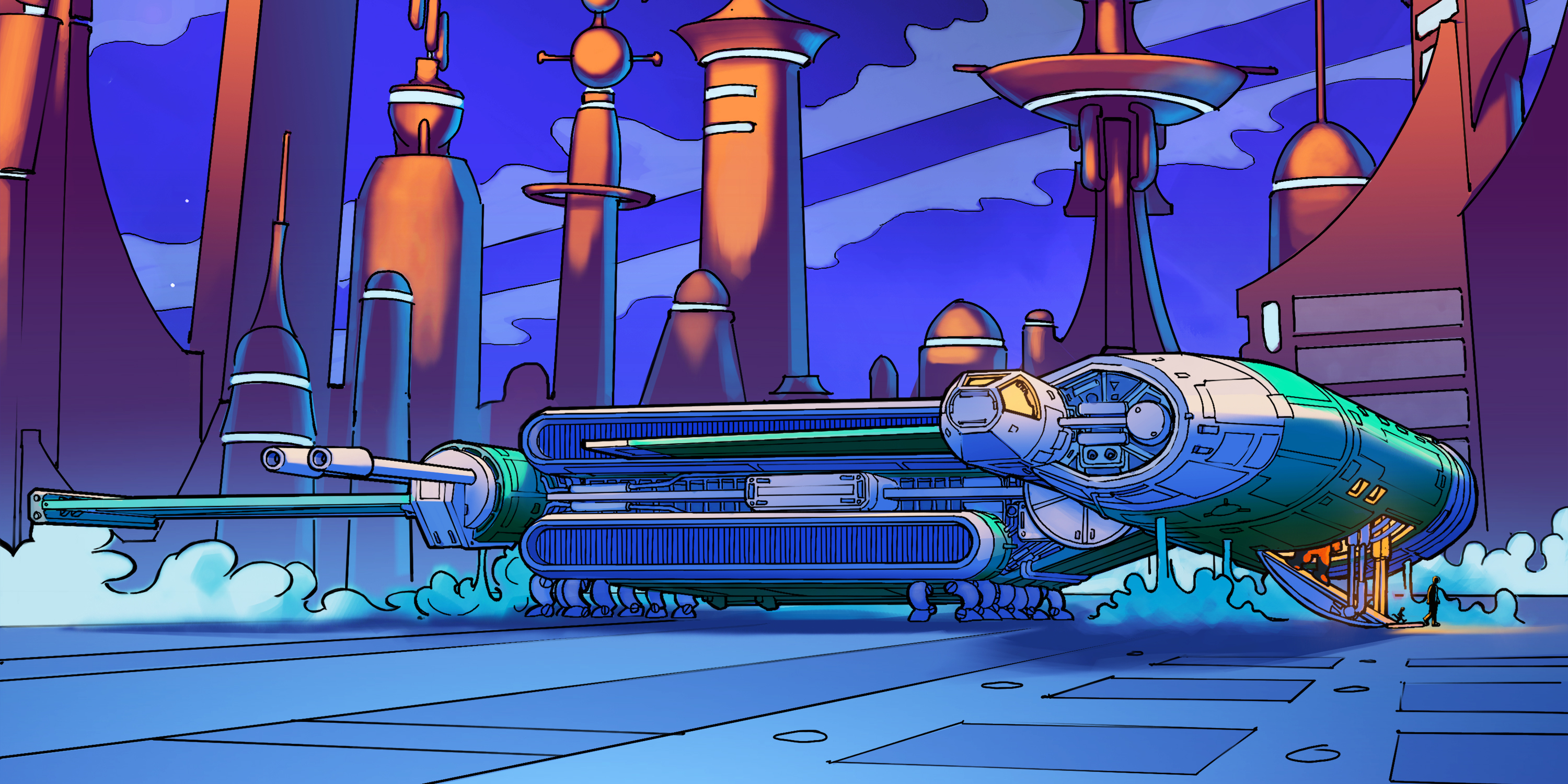
The Bargerian Jade, both a character and a setting
First of all, tell us a little about your background and how you got to where you are today.
Alden (editor/actor): All six of us have been doing comedy in New York, primarily at the Upright Citizens Brigade, for over a decade, and our sound designer Shane has been working in music production for at least that long. We’re also all lifelong sci-fi geeks.
I started doing comedy in NYC in 2005, taking long-form improvisation classes at UCB, and started doing improv and writing sketch with a team shortly after I started taking classes. We started out performing live, but when we moved into doing filmed sketches, I learned a bit more about editing and about getting the most production value mileage out of self-produced stuff: where you could cut corners and what kinds of things you needed to do right.
I’ve always loved making high-concept genre stuff. So when we started formulating the idea for the podcast, I felt like this was a confluence of a lot of the stuff I’ve working on and thinking about for years: something that is genre heavy, that’s both an homage and a parody, and something that we can make scrappy and it will sound like a much bigger production than it is.
Seth Lind (editor/actor): I’ve been performing improv in NYC for 12 years, mostly with a group called Thank You, Robot that includes Jeremy Bent, who plays C-53 on Zyxx. We are apparently the longest running improv team in the city which, in the words of the late, great David Carr, is a bit like being the tallest Leprechaun.
I’ve worked at This American Life for the same amount of time, 12 years, currently as director of operations. With Mission to Zyxx, I love that I get to mix my audio and comedy experience together.
Alden and Jeremy started talking about doing a podcast, and Jeremy recommended bringing me on board because of my audio background. I’m very thankful he did. It’s such a satisfying project. Before all this I did a masters degree in media studies at The New School, where I made some short audio documentaries and dabbled in film. I grew up mostly in Minnesota and Wisconsin.
When I was 8 we lived in Anchorage for a year. We moved there by car from Minnesota, and listened to BBC’s Hitchhiker’s Guide To the Galaxy on cassette several times while driving the Al-Can highway. I adored it and it makes me happy to have ended up making something with a lot of that absurdist sci fi DNA.
Moujan Zolfaghari (actor): I studied economics/political science in college and decided to use none of it and instead, follow my dreams. I moved to NYC from the SF Bay Area to pursue my love of comedy, even though I wasn’t entirely sure how. So I got an education at the UCB Theatre starting in 2009, and have inched my way into doing real TV writing and acting jobs that have somehow (and luckily) turned into career.
Along the way I met many talented people, like Alden, who knew I was a sci-fi fan and asked me to get involved in Zyxx back in October 2016. I didn’t hesitate and quickly replied back to his email with “SOUNDS GOOD, YESSSS!!!”
Allie Kokesh (actor, Dar): Really good people. Who have collaborated with me. Recommended me. That I’ve worked for. Who have helped me.
Jeremy Bent (actor, C-53): Grew up a weird kid in Rhode Island and went to Boston University for film & TV, where I was part of a sketch group that really cemented my desire to make comedy a full time thing. Came to NYC after graduation and started taking classes at UCB. After taking 10 years to get way better at it, I now teach improv there, write for some things, and my voice pops up here and there across the internet/television.
Winston Noel (actor): My background as it pertains to Zyxx is with the Upright Citizens Brigade. I’ve been studying, performing and teaching improv there over the past 10 years. Improv has opened doors for me in both my professional and personal life, and I love it. Hear that, improv? I love ya!
Shane O’Connell (engineer/mixer/sound designer): I became interested in recording around the time I started playing in my first bands. In high school I taught myself the basics on a used ADAT I saved up for by mowing a bunch of lawns (this was around the time when computer-based DAWs were just starting to become the standard medium, but still too expensive for an average teenager to afford). For college, I attended NYU to study music production where I got formal training in engineering and commercial recording studio workflow.
Until Mission to Zyxx I had never attempted sound design but had always been curious to try it out. Growing up my godmother, Claire Graybill (back then Claire Sanfilippo), worked at Skywalker Sound as a dialog and foley editor. She got me interested in movie sound early on, which is a big reason why I jumped at the opportunity to work on this show.

Alden Ford, Jeremy Bent, guest improviser Dru Johnston, Allie Kokesh and Moujan Zolfaghari, recording episode 202 of Mission to Zyxx at Stockholm Syndrome in Brooklyn
Take us through your process for an episode of the show.
Alden: Each episode begins with getting pitches from our guests. We’ll often get two or three and pick the one that feels like the best fit for the show. In the studio we’ll decide roughly how and why we encounter the guest, like whether they’re someone we’re assigned to meet or whether they attack the ship or something.
Then we’ll start rolling and jump in. We almost always start on the ship for a few minutes, head to the planet or however we encounter our guest, find a reason to leave, and end with a closing scene back on the ship. We usually record for about 60-90 minutes, then we try to edit it down to about 30 minutes.
Jeremy: We usually take a break halfway through recording to figure out how we wanna wrap things up.
Allie: Everyone gets to pitch and build together. And then we start to circle in on something we like, or something most of us like and the others can see the beauty in. It’s art by committee.
Moujan: When it comes to Bargie, I go into each recording with the goal of further developing her character (she’s a struggling has-been sentient spaceship actress) and to make sure we learn about her through her relationship with the other characters on the show. But then most of the time I like to challenge the group by just throwing out-of-nowhere lines or moves, because I know they will beautifully back it up and justify it to make perfect sense in this world. (Especially Jeremy Bent’s all-knowing droid C-53).
I also play any supporting characters that are needed (alongside Seth Lind and Winston Noel), and always have an ear out if there’s a need for one, whether it be to colour the world or to further the scene.
Winston: Since I play many of the auxiliary side characters, I try to be honest about whether or not I should appear in the episode (I always want to) and what’s the most natural way to appear and support. I then try to create a quick voice or mannerism for the character that A) makes sense and B) is something I haven’t done before.
Alden: The big ambition of the show is that it attempts to combine the surprising and magical elements of great long-form improv with the intriguing, satisfying plots and characters in a legit sci-fi series. Solid improv is all about not thinking too much, but good sci-fi is usually about being very thoughtful and deliberate. That’s where the edit comes in.
I think having the ability to explore these situations as long as it takes to work them out — knowing we can go back and condense something, or cut something that didn’t work out — is the thing that makes it possible, occasionally, to have it both ways. So our workflow in making the show is all about maximising our ability to do both of those things.
For post production, either Seth or I will take a first pass at an edit, which usually takes anywhere from 5-10 hours. Then we’ll send it to the other to listen and put together notes, looking for additional trims, places we need clarification, etc. Then we’ll do a second pass, and occasionally a third or fourth. Once we’ve got it down to what we consider essentially our locked cut, I go through the project file and add notes throughout pointing out places to add sound effects — a door opening, blaster fire, what kind of background ambience or voice filters I’d imagined for a particular scene or character, etc.
Usually two or three dozen notes, anywhere from “Bargie’s hatch opens” to a paragraph or two describing an action sequence on a planet the crew has never been to. Then I send that project file to Shane, and he goes through and designs to my notes as well as adding a ton of his own stuff into each episode, which takes 20 — 30 hours of work. Then Seth and I will usually do a round of notes with Shane, and it will be good to release. It’s a pretty involved process compared to a lot of podcasts but I think it shows in the final product.
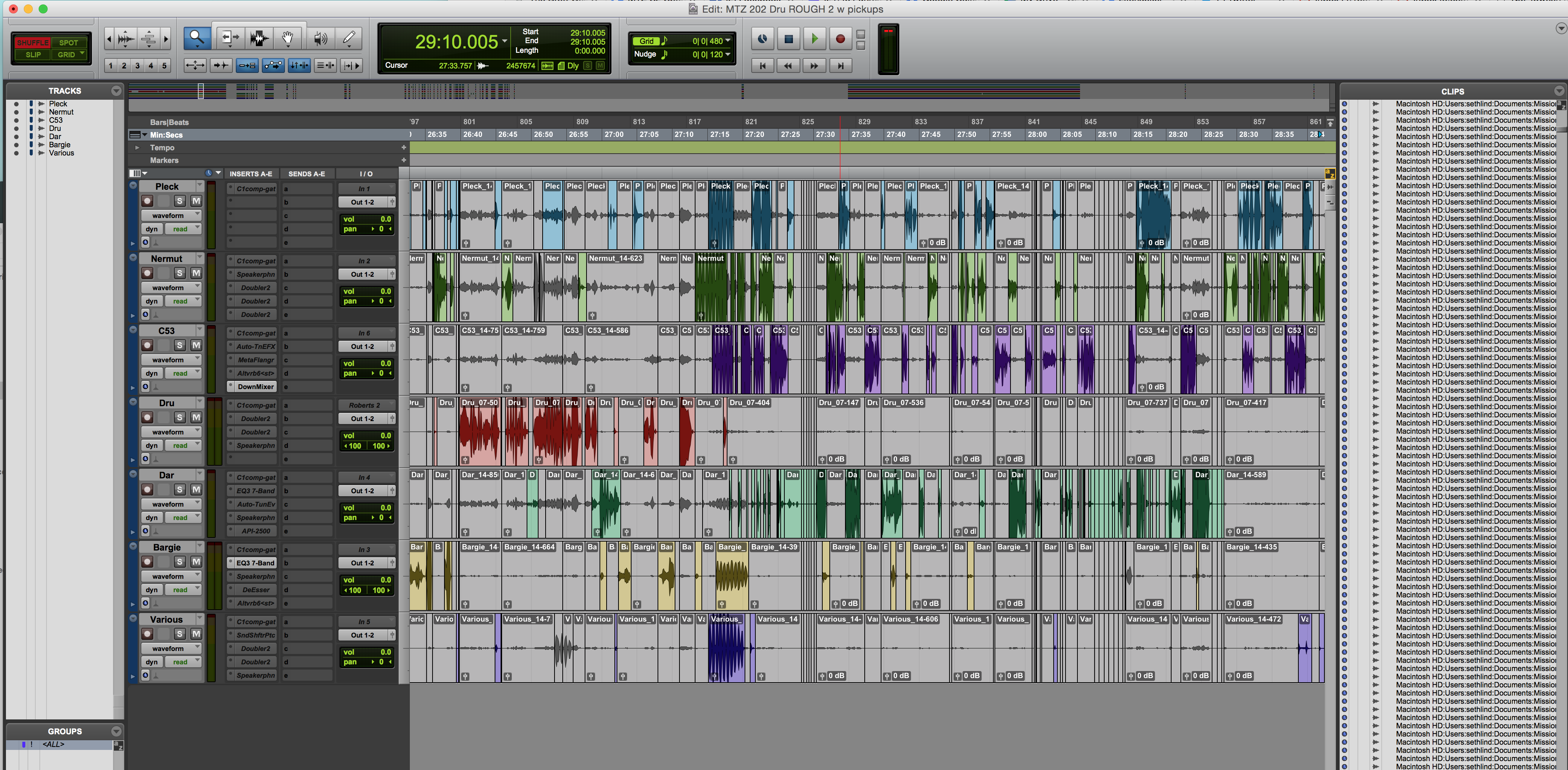
An episode during the edit process
Seth: An episode recording clocks in somewhere between 1 and 2 hours. The finished episodes are between 25 and 45 minutes, so a lot comes out. It takes me two solid days to get to a rough cut, which entails listening through several times and making cuts to pick up the pace, make jokes hit harder, lose bits that are off character or didn’t pan out, sometimes reorder sections to make them more linear, and find nice blackout lines at the end of each of the 3 — 4 acts. It’s mostly streamlining, but sometimes the structure or meaning can change a lot in the edit.
I REALLY love that we get to have it both ways: Totally improvising the performance, then obsessively editing to such a micro degree. For example, we just recorded an episode with guest comedian Christopher Scott playing a droid casino dealer for an absurdly complicated, life-or-death stakes card game. The joke is, he explains the byzantine rules so fast that there’s no way poor Pleck can follow. And in editing I decided to cut out every single breath he took and shorten many other pauses, just to hit that game even harder.
Once I’ve edited for content, there’s a phase of about two hours of just muting the tracks of people who aren’t speaking. Because Bargie and C-53 and other characters have vocal effects, background bleed would sound really weird. I pass the rough cut to Alden who normally sends me two rounds of notes: mostly cuts, sometimes more dramatic changes.
Occasionally we pick up a line or two, to bridge a gap or sort of narrate some action that’s hard to convey with sound design. Occasionally we’ll redo an entire intro or record a new beat to add to a scene that wasn’t quite whole.
The last and very fun step in editing is choosing an uncut outtake to include after the end credits, usually a moment where someone breaks hard. Or all of us do. That was Shane’s idea on the very first episode, and I so love that he thought of that. Listeners tell us they appreciate these clips because they show that we’re really making this up on the spot.
And they get to hear just how much Shane adds to the raw recording. We pass the fine cut to Shane, who sends us mixes-in-progress including sound effects, and then there’s another review phase. For example, just now Shane Dropboxed the first scene of 202, and Alden and I LOLed at some very choice foley work on the character Beano walking around the ship. My only note was “Maybe we add a stomach rumble to Pleck?”
Shane: On average, it takes me 30 — 40 hours to sound design and mix an episode. I usually get the edited Pro Tools session a week before the release date, so the first thing I do is take a look at the session and make a loose plan of attack based on what my free days and nights are that week.
That first look is also when I do a very zoomed-out pass on the episode, loading the files into my mix template, adding the common background ambiences and simple SFX that I’ve created for previous episodes, and reading the memory location notes where Alden and Seth describe their ideas for particular SFX moments and sequences.
This first pass is when my ears are fresh, so it’s typically when I come up with the bigger ideas that I can hear in my head, but don’t necessarily know how to execute. These sequences are the most time-consuming so I jump into working on them right away.
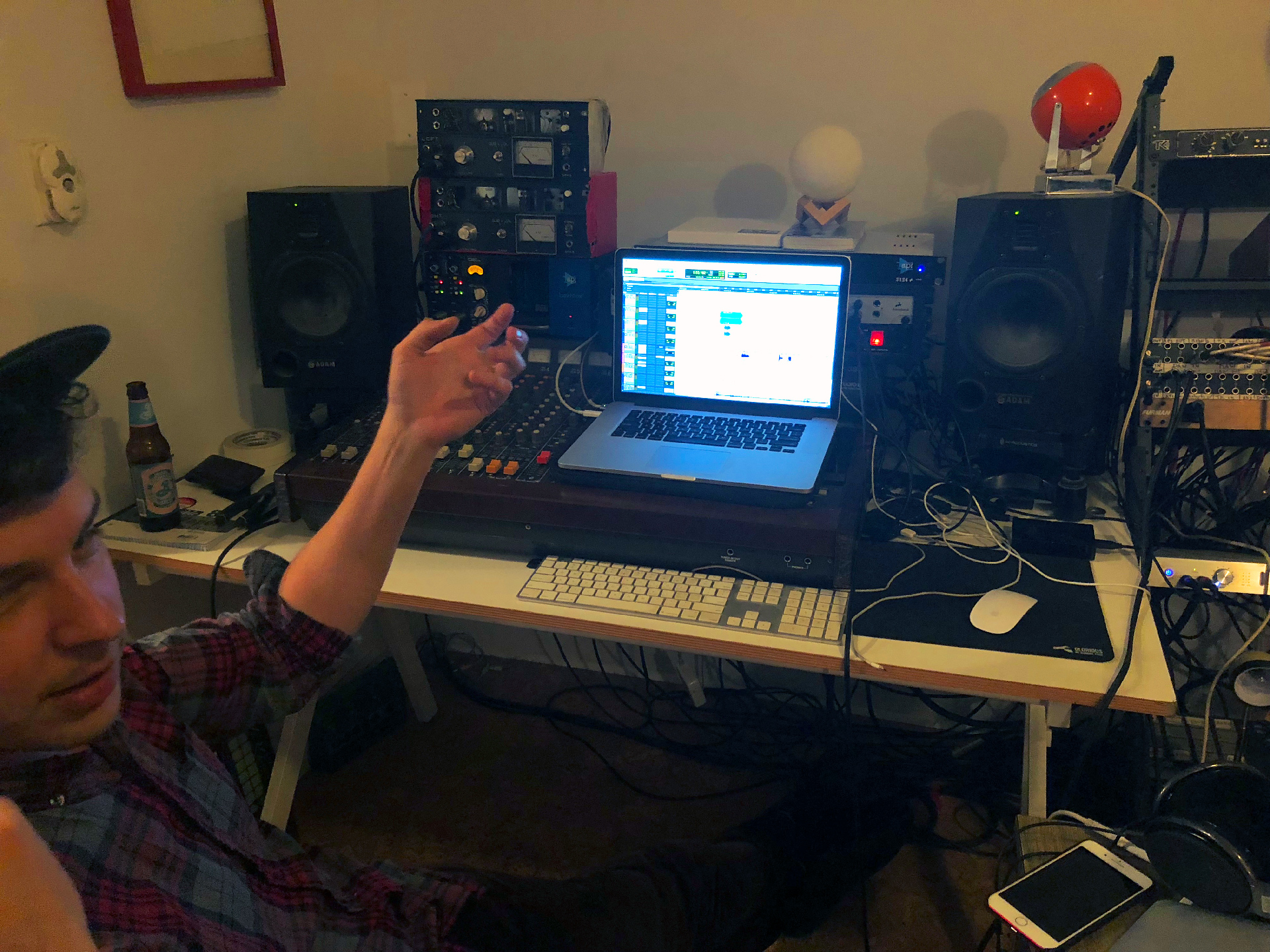
Engineer Shane O’Connell during a recording
Alden: As far as the sort of bigger plot and story threads we try and weave throughout the show, those are usually some combination of discussions we’ve had before or after recordings, brainstorms over email or GroupMe, or even just improvised decisions we thought were so funny or had so much potential that we had to bring back. As the show goes on, it might seem to be intimidating to have so many character and plot balls to keep in the air, but more often it just means we have a bigger well of fun stuff to choose from, without feeling like every decision means pulling a whole chunk of the mythology out of thin air.
Shane: The big sequence in the season 2 premiere was a particularly tricky one. At the start of act 3 (spoiler alert), the rebel pilot is in his fighter leading our crew to their next mission when his hyperdrive fails and shoots him off into space. Seth and Alden had a note at that location in the session that said the sequence should take place over the crew’s radio. The pilot struggling with the controls, and the explosion sounds, would be processed through an effects bus I use for Bargie’s comm system.
This was also my first instinct, but because we had some extra time to work on this episode I wanted to go for something more complicated, and hopefully make the joke land harder in turn. The crew has possibly killed their new boss and they react with the emotional equivalent of a “yiiiiiikes” collar pull. My instinct was to make fighter breaking up sequence as dramatic and intense as possible so that the crew’s muted reaction was that much more disproportionate.
Also, Jeremy Bent played the fighter pilot so well and with such great intensity that the scene lent itself to a perspective change.
I ended up starting the scene in the pilot’s fighter. It sounds small and cramped, Jeremy’s voice is in your face, and our main characters are the ones over the comm system. As things start going wrong, alarms go off around your head, different parts of the ship start to explode, and the engine starts revving peculiarly under your feet. Because this is audio only, perspective-shifting within a scene can be difficult and in this case, took the most amount of time to solve.
We ended up making the last explosion kind of morph into radio static and through that static, the camera shifts back to Bargie as they hear the end of the disaster over their radio. After several revisions, the whole process ended up taking about 8 hours to complete, while the sequence itself lasts for less than a minute.
How do you fit the show into the rest of your life?
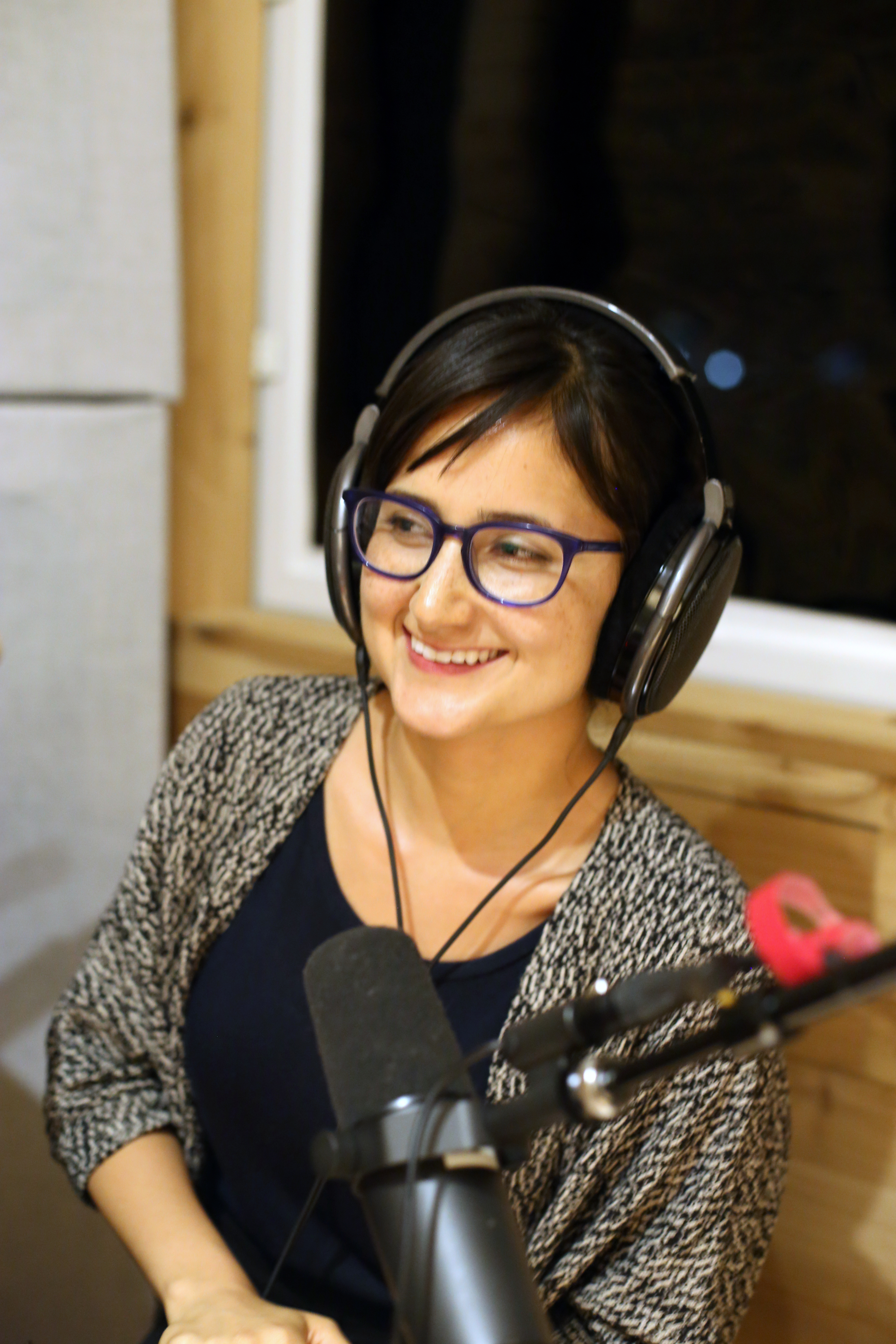
Moujan Zolfaghari
Moujan: We all have busy schedules, so we tend to record on weeknights, or on weekends, so the schedule works out. Plus, it never feels like a burden because it always just feels like hanging out with my friends. And since I work both in NYC and Los Angeles, I have a Yeti mic and can Skype in from LA and record from wherever I’m staying. So this podcast fits in very easily!
Winston: It can be difficult! I also have a full time job as a copywriter at an ad agency, so I’m usually the person who has to have a hard out on a late night recording session.
Allie: It’s my first priority. So. Easily? I have no problem blocking off full nights to record.
Alden: I’m lucky that the better-paying gigs in my life still leave me some time to work on the podcast in the spaces between. But I have learned to block off Tuesday evenings since they’re usually spent listening to cuts and giving last-minute notes ahead of our Wednesday morning release.
Seth: I’m really lucky in that my day job is 30 hours over 3 days. So I have all day Mondays and Tuesdays to edit Mission to Zyxx. And we always record episodes in the evenings or weekends, so it fits pretty well. It’s the first gig where I’ve texted regularly with collaborators, and that’s the hardest place to draw boundaries. I’m always on the clock via text…and am also like, I TEXTED ALDEN THREE MINUTES AGO, WHERE IS HE!?!?
Jeremy: My time commitment to the podcast isn’t so high as say Alden or Shane. I record with the group, I occasionally record some of our ads from my apartment, and I write Hark’s Tough Love, an advice column for our Rebellion website. It’s not so hard to slot all that in.
Shane: By not having a life while the show is in production.
What apps, gadgets, or tools can’t you live without?
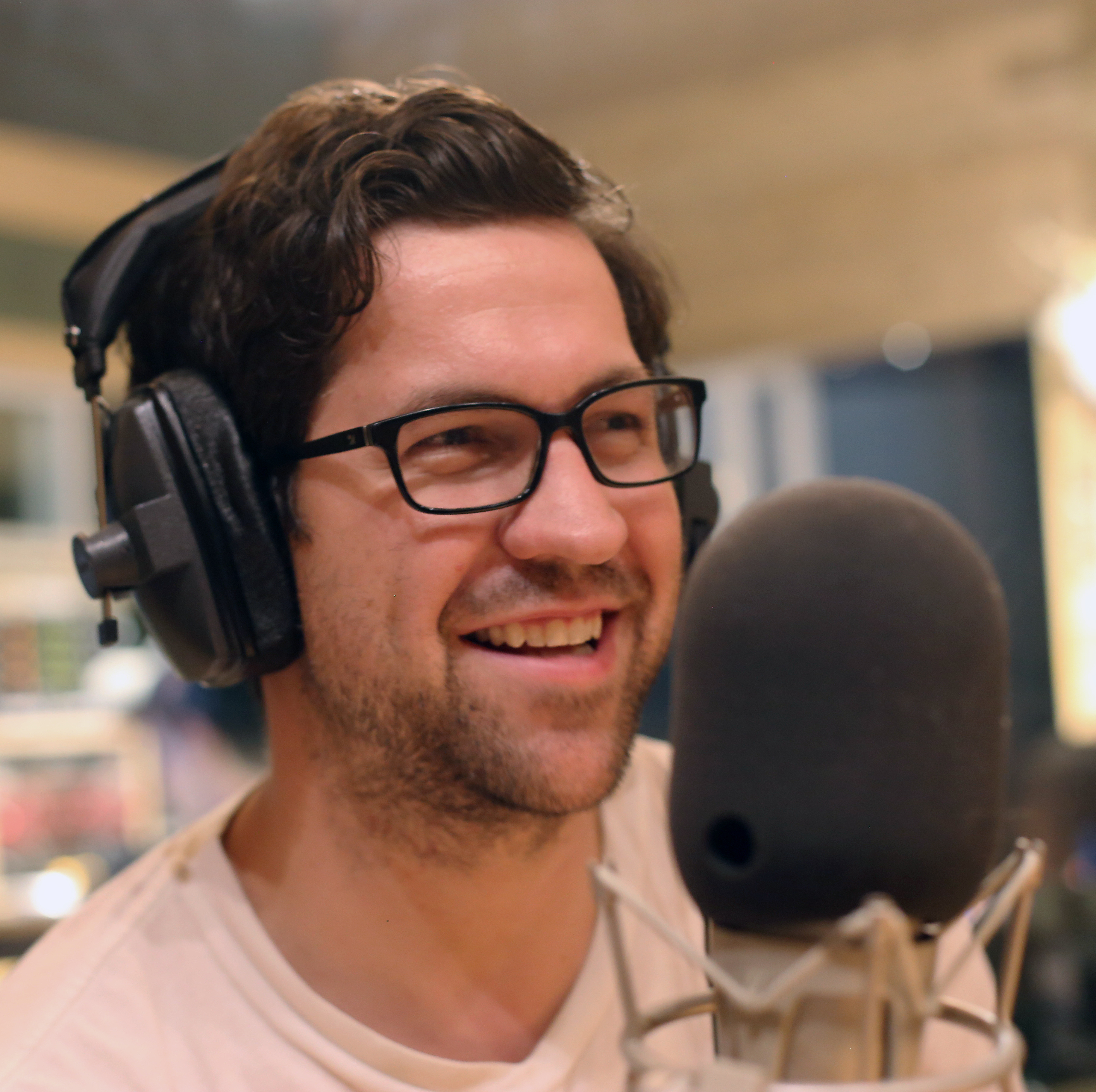
Alden Ford
Alden: We work in Pro Tools, and coming from the video editing world it was daunting to navigate the UI, but the learning curve was fairly brief, especially since I use it almost entirely for basic editing.
I also have a Blue Yeti mic that comes in handy if I need to send a quick pickup.
Seth: Pro Tools for editing sound. Dropbox for sharing files, including the mobile app for listening to Shane’s mixes on the fly. GroupMe for constantly goofing around with the rest of the cast and quickly strategising to replace guests who cancel. Patreon for keeping the lights on. Discord for chatting with Patreon backers. Skype for connecting to Moujan or guests in LA.
Shane: My little Tascam handheld field recorder that I use to record foley and ambiances for the show. Soundtoys plugins. My Beyer Dynamic 770 headphones that I use as my main mixing headphones for the show.
Moujan: iPhone. I wish it wasn’t, because I’ve been trying to use my phone a lot less in the past year. But at the moment, yes, very much so, iPhone 100000% BFF.
Allie: GroupMe! I always get so far behind I end up reading hundreds of messages debating plot points and dinner orders.
Jeremy: I bought an Audio Technica 4040 mic about seven years ago when I started getting into voiceover stuff, and I’ll be damned if it hasn’t done the job every single time. My audio interface has died, I’ve had to replace trashed mic cables, but the AT4040 is a workhorse. Also, GroupMe is the Mission to Zyxx app of choice for distributing hot goss.
What’s your workspace setup like?
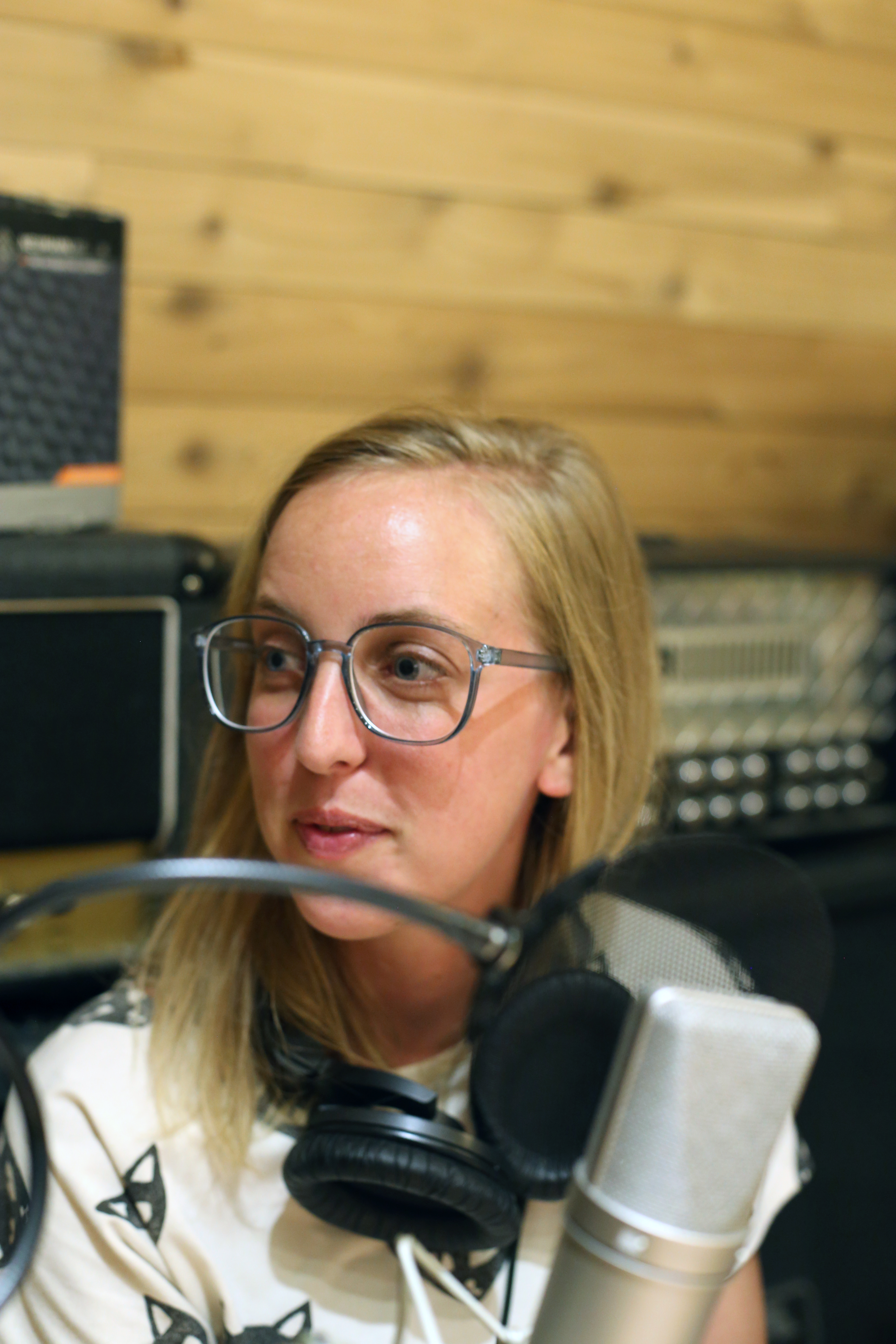
Allie Kokesh
Allie: We record in Shane O’Connell’s apartment! We circle up and capture it.
Alden: I work in my living room at my iMac, with a pair of small audio monitors. I generally use headphones to work on Zyxx, though, since most of our listeners use them and Shane mixes the show to sound best that way.
Seth: I have a small cluttered desk with a 27″ iMac on it, near the door to my balcony and a bunch of houseplants. Being close to the open door makes me feel less like a disgusting house monster when I edit for 12 hours straight without leaving my apartment.
Shane: I mix the show at a little desk in a corner of my apartment. My computer sits on my old Tascam 388 tape machine. The zone is cramped between the wall and the back of my couch where my dog usually sits while I work. I have a blueprint of the Enterprise from TNG in front of me and one of those little 3D printed moon lamps that I bought on Instagram sitting on a speaker.
What’s your advice to anyone starting a comedy or drama podcast?
Jeremy: Do it! Talking about it is great. Planning it is even better. But nothing happens until you actually make it. We made two whole episodes of Zyxx eight months before it actually started, and we learned a ton. One ended up being part of Season 1, and one didn’t. So you might nail it immediately, or like us, you might have to go back to the drawing board, but you’ll know so much more from having made it.
Alden: There are so many corners of the audio world that have yet to be explored. A podcast that’s just two straight white guys talking about music (like my first podcast with Winston Noel) is easy and fun, and can be terrific, but the intimacy and connection you can forge with a piece of audio has such an enormous potential — it’s your ideas, piped literally and directly into your audience’s heads, one person at a time. It’s so simple and beautiful. So for us, it was natural to think, let’s make a cool, funny, weird world we can all play around in, which is hopefully something people will find really fulfilling.
There’s still a lot of room for ideas and great execution. If you can bring great writing, acting or sound design to a podcast, you’ll really stand out and people will be interested in the process as well as the actual content, which makes people more invested in the whole show.
The only other piece of advice I have is to edit! Podcasting seems to be the only medium where nobody expects anything to be edited, so something with thoughtful pacing and good comic timing or dramatic tension is still pretty rare and will elevate everything you do. And it reminds people that you care about the work you’re doing, and that everything they hear is a choice you’ve made.
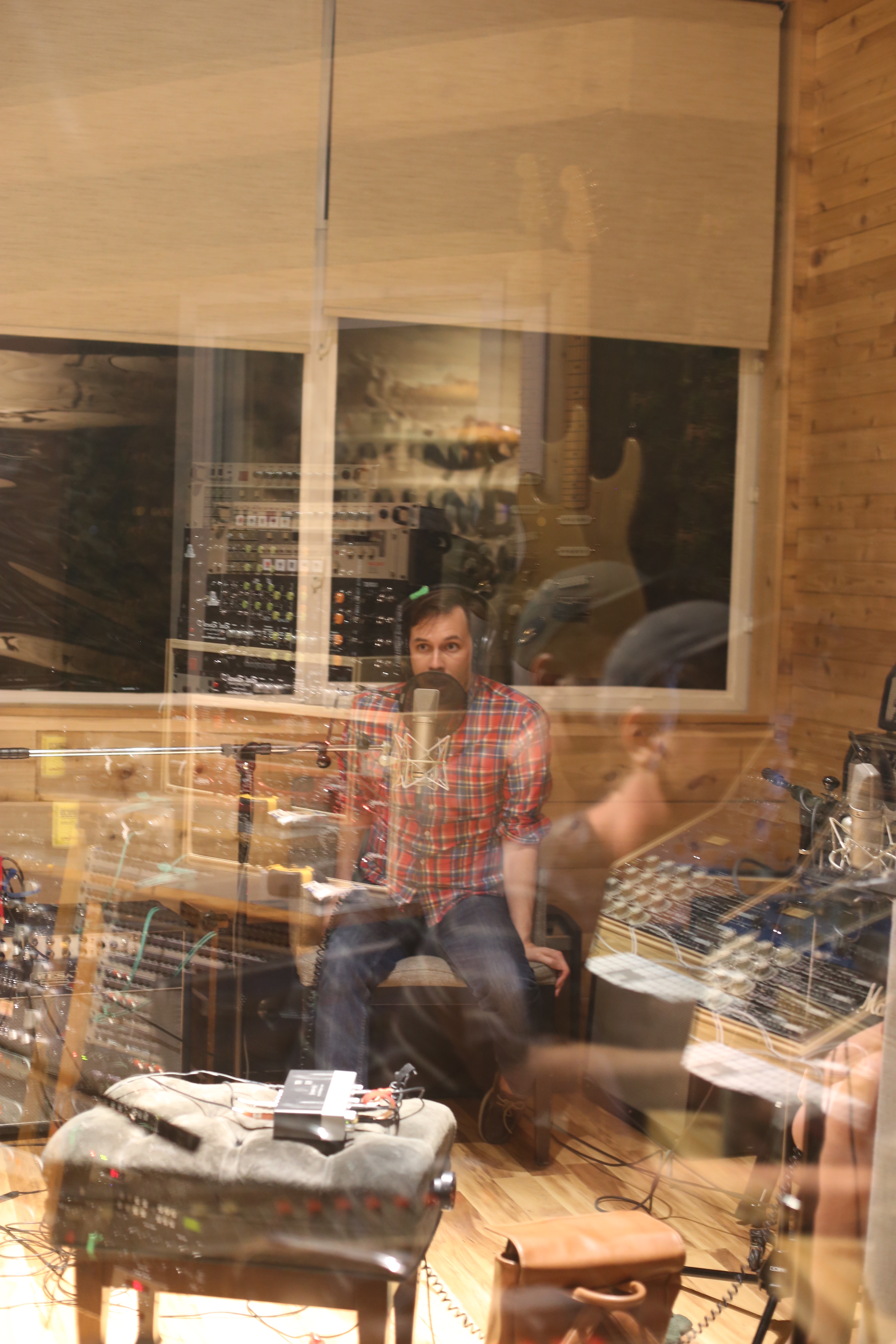
Winston Noel
Winston: Make sure the project is something that excites you and isn’t something you feel you “have to do” in order to further a career in entertainment. Then, find fun people to make it with.
Seth: If you can at all avoid it, don’t read scripts from a page. Unfortunately, acting in fiction podcasts is largely dreadful. Just because we can’t see your actors doesn’t mean you shouldn’t get them off book and performing a scene like they would for a film: memorised, looking each other in the eyes. We get around this on Zyxx by not having scripts at all and improvising everything, which just makes cadence and language feel more natural.
Also, check out what’s been done before and make sure your idea is specific. The world maybe doesn’t need another fake public radio investigation, or another dystopian satire — unless they have super surprising hooks and are NOT READ FROM THE PAGE. I’m not angry, just disappointed and angry.
Moujan: Find people you enjoy working with, because you’ll be staring into each others eyes for many hours. Also, start a GroupMe account so you can annoy each other at all hours of the day with off-topic banter. (I very much do this with the Zyxx crew. Sometimes too much.)
Take us through an interesting, unusual, or finicky process you have in place.
Alden: I think the reason long-form improv hasn’t really taken hold in a recorded medium before is that if you’re not watching it live, you miss out on the magic a little bit. Being in the audience of a great improv show makes you feel like it’s your show too, which it sort of is. You’re there watching it happen, and your response shapes the show, and you can feel that viscerally as an audience member, and it’s intoxicating.
I believe the reason it’s working so well for so many podcasts is that it somehow retains that live feel, probably because of the intimacy of listening to podcasts alone, as most people do. Plus with little micro edits which speed up the pace between lines, you’re able to ramp up the pace without losing the spontaneous performances, in a much less noticeable way than if you tried to do it on video.
Winston: The first episode of season 2 was difficult to get right. We considered time jumps and completely different show structures before remembering that the interaction between our characters is the show’s real draw, so we decided to get out of our own way and just get the characters back together doing missions as soon as possible.
Seth: This is pretty tiny and random, but while editing episodes, several times I have changed numbers. Meaning, changed the number that a person said in an improv scene. For example, someone referenced a show in a club that has a seventy drink minimum. But a seven drink minimum is actually funnier, because it’s plausible. So we snipped the “ty” in seventy. In another episode, The Grower Mind of the K’hekk said a process had happened over x million years. But to make “sense” (ha), it actually should be billions. So I snagged a B from another word.
Shane: I want the sound design of Mission to Zyxx to function as a way to lower the barrier of entry for listeners who would otherwise not be drawn to radio dramas/fiction podcasts. It’s hard for some to get past the hokeyness of the whole endeavour and get to the point where you’re along for the ride, and just enjoying time with the characters. My approach is to load up the show with so much detail that the sound effects kind of fade into the background rather than stand out. Hopefully, that tricks the listeners’ ears into accepting the reality of the show so that they can get into the story and characters more easily.
The most finicky thing I do to achieve this is through psychoacoustics techniques that help create a sense of space. When a scene takes place on the ship, I use a particular reverb ambiance on the characters and action that evokes a size and construction of that space. When the characters walk into an elevator, for example, I’ll automate the reverb time to be faster, and automate the high frequencies down. This has the effect of making the space feel small and dull sounding.
When a character walks away in a scene, I’ll not just fade their volume down, but ride the reverb up and automate an EQ to progressively roll off the high frequencies and low frequencies which is quality of sound propagation in the real world. It’s a very micro detail that only really works if you’re listening on headphones, but it’s the kind of sound design that I think goes the furthest to put the listener in the scene.
Jeremy: There’s so much great improv done in the show, but I’m never more impressed than when Shane O’Connell, our sound engineer and designer, adds little audio jokes into the show that I either didn’t expect or that no one will ever find. Great example: in episode 102, C-53 claps and no one joins him. Shane added a clanking sound, and I burst out laughing, because yes, it sounds weird if a robot claps and no one else does.
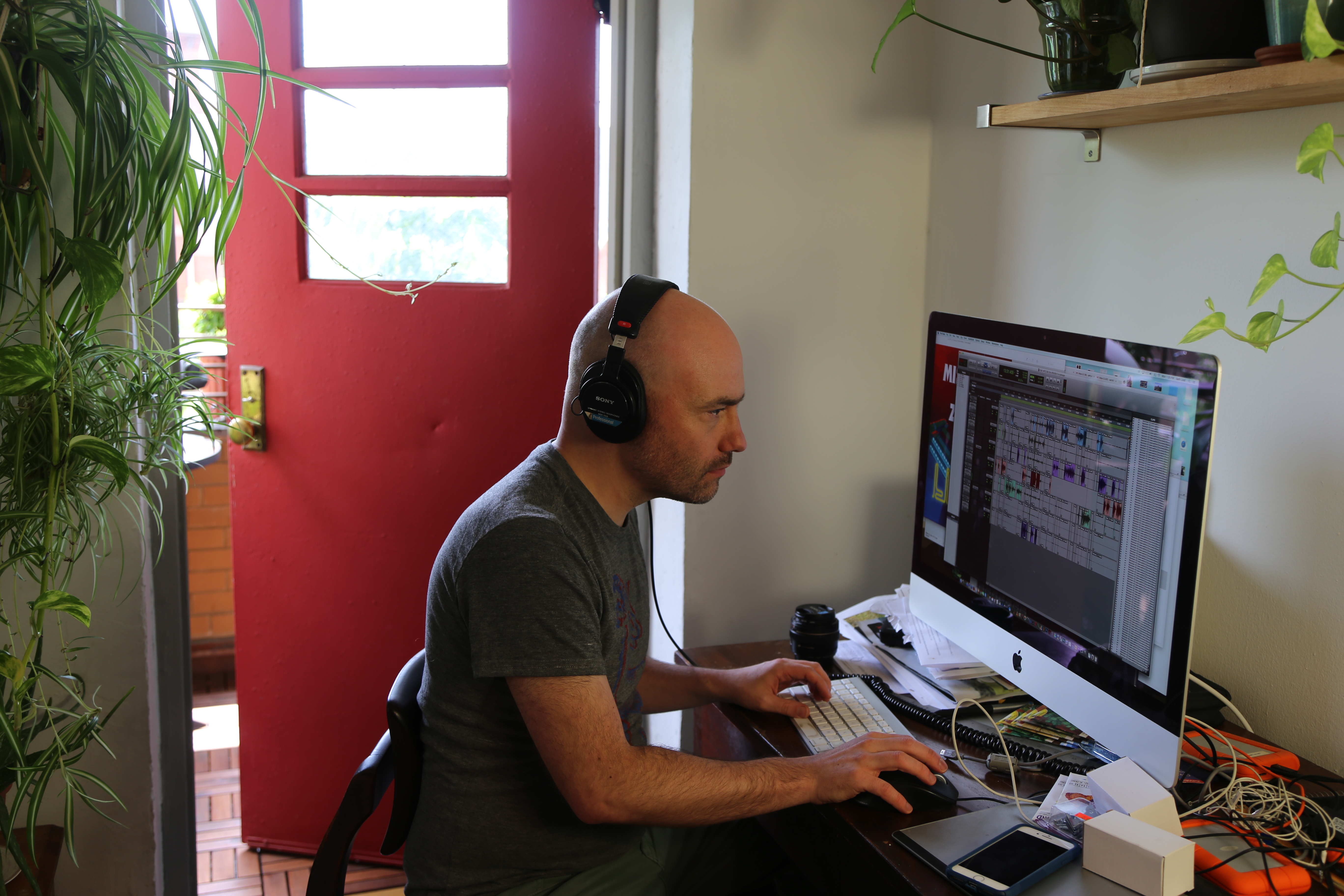
Seth Lind editing the show
Who are the people who help you get things done, and how do you rely on them?
Alden: We all lean on each other heavily throughout every step of the process, which is amazing. Improv is all about agreement, support, and adaptability, so we go into the record knowing that whatever crazy shit we throw out will be caught and cared for by the rest of the team. It’s really important in live performance of course, but in a serialised format, it creates such a strong sense of shared ownership that is so rare.
Logistically, I don’t think post-production would be possible if Seth, Shane and I weren’t in constant contact and willing to stay up all night before releases to help each other out and make sure everything sounds good. Shane carries an unbelievable amount of the workload and creative energy of the show, making every scene, character and sound effect meaningful, unique and funny.
Allie: I mean. I have the luxury of just contributing my time. And never having to worry that it will become something perfect. The other half of our cast not only is hilarious but they also edit hours of content into a beautiful 20-minute episode, negotiate with sponsors, and look towards the future for all of us.
Seth: I mean, this cast is fucking amazing. The fact that we can sit down with nothing and an hour or two later have the material for a satisfying episode, it just feels like we’ve struck some kind of gold. We all created our own characters – with some thought of how they fit together, but largely on our own, in terms of their personalities and character games. I think that really led to them gelling and their games having longevity. Because we all believe our own characters.
And when we heard Shane’s mix of the first episode, we were like OH SO I GUESS THIS SHOW IS GOING TO SOUND GREAT.
Shane: I really love the working relationship I have with Seth and Alden. I totally trust their taste, and they know that they can tell me if something isn’t working without me pushing back. This frees me up to indulge every sound effect idea I have without worrying about whether it’s over the top or not making sense.
Jeremy: Alden is way, way more organised than I will ever be, and I’m not sure Zyxx would exist without him. My girlfriend Diana is also a queen for asking, “What’re you gonna do today?” when she leaves for work, because it puts the heat on me.
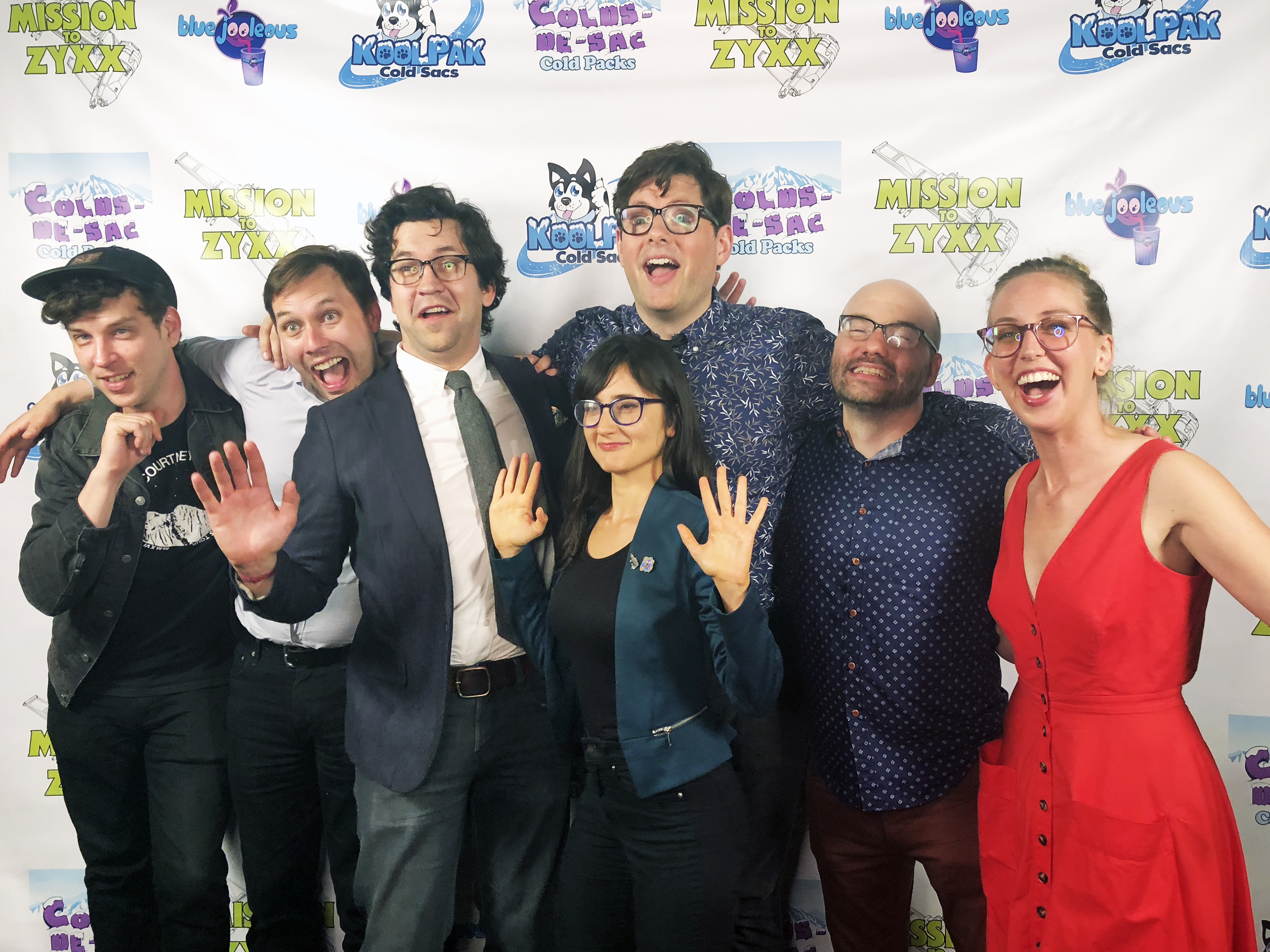
Mission to Zyxx creators Shane O’Connell, Winston Noel, Alden Ford, Moujan Zolfaghari, Jeremy Bent, Seth Lind and Allie Kokesh
What are your (other) side projects?
Allie: I’m A Doctor Now! at Caveat.
Jeremy: I perform every week at UCB Theatre East Village with a group called Bucky and it is a constant source of joy, as are my other two groups, Rumpleteaser (also at UCB) and Thank You, Robot (monthly show at Caveat). I may or may not also be working on a text-based adventure game for Mission to Zyxx.
What are you currently reading, or what do you recommend?
Winston: I’m reading some old school sci-fi right now: War of the Worlds. For another fun sci-fi read, I’d recommend Hyperion by Dan Simmons.
Seth: Currently Stern, a 1962 novel by Bruce Jay Friedman. It’s pretty good, not sure I’d recommend it. If I had to recommend one book, it’d probably be Tree of Smoke by Denis Johnson. It’s so patiently written. It feels like he’s just describing what he’s seeing. There’s no false urgency to make it fascinating. I don’t read very much. It’s a failing.
Allie: The Girl Who Never Read Noam Chomsky. I’m reading it right now and keep highlighting these moments that resonate with my early twenties.
Jeremy: Currently reading Acceptance by Jeff VanderMeer from his very good Southern Reach trilogy. As for other recs, you’ve got to read Ursula LeGuin. Either The Dispossessed or The Left Hand of Darkness will do you right. I got really into Italo Calvino last year, because Invisible Cities and If on a Winter’s Night a Traveller are both incredible. 1491 by Charles Mann is so interesting I read it eleven years ago and I’m still thinking about it. Geek Love by Katherine Dunn is the book I tell everyone to read and no one does.
Moujan: I love sci-fi but my education and references are more from TV and movies. So currently I am going into a deep dive of sci-fi’s greatest writers, as recommended by my fellow nerd friends. I just started reading The Dispossessed and IT. IS. GREAT.
What podcasts do you recommend?
Allie: My Favourite Murder.
Winston: I enjoy Criminal, the 538 politics podcast, and have just started to listen to early episodes of Lore.
Seth: Song Exploder. WTF. The first season of Homecoming. Reply All.
Shane: Mystery Show.
Jeremy: The Tobolowsky Files is probably my all time favourite podcast, because he’s an incredible storyteller, even when he’s not talking about working on Groundhog Day (although that episode is fantastic). My friends Matt and Eric do a guided meditation podcast called Headplace, which is somehow both very entertaining and legitimately calming.
Moujan:
- News, in digest: Up First (NPR)
- News, deep-dive: The Daily (NY Times)
- News, in review: It’s Been a Minute with Sam Sanders (NPR)
- All around: Reply All (Gimlet)
- Hollywood history: You Must Remember This (Panoply)
- Hollywood education: I Was There Too (Earwolf)
- Hollywood people talking: The A24 Podcast
- Mental health: The Hilarious World of Depression (APM) & Relatively Healthy with Janie Stolar (ForeverDog)
- Book and history and comedy lovers: Public Domain Theatre (ForeverDog)
…I listen to a lot of podcasts.
What’s the best advice you’ve ever received?
Seth: “Ehh, don’t be a teacher. Go to New York and write for SNL or something.”
Moujan: Be kind and persevere.
Allie: Be kind.
Jeremy: “You are not the hero of the story of your life.” A friend of mine in college said this, and I think he meant that life is not a narrative. It helps to keep things in perspective.
Who else would you like to see answer these questions?
Seth: Paul Reubens.
Allie: C-53.
Jeremy: David Byrne.
What’s your best shortcut or life hack?
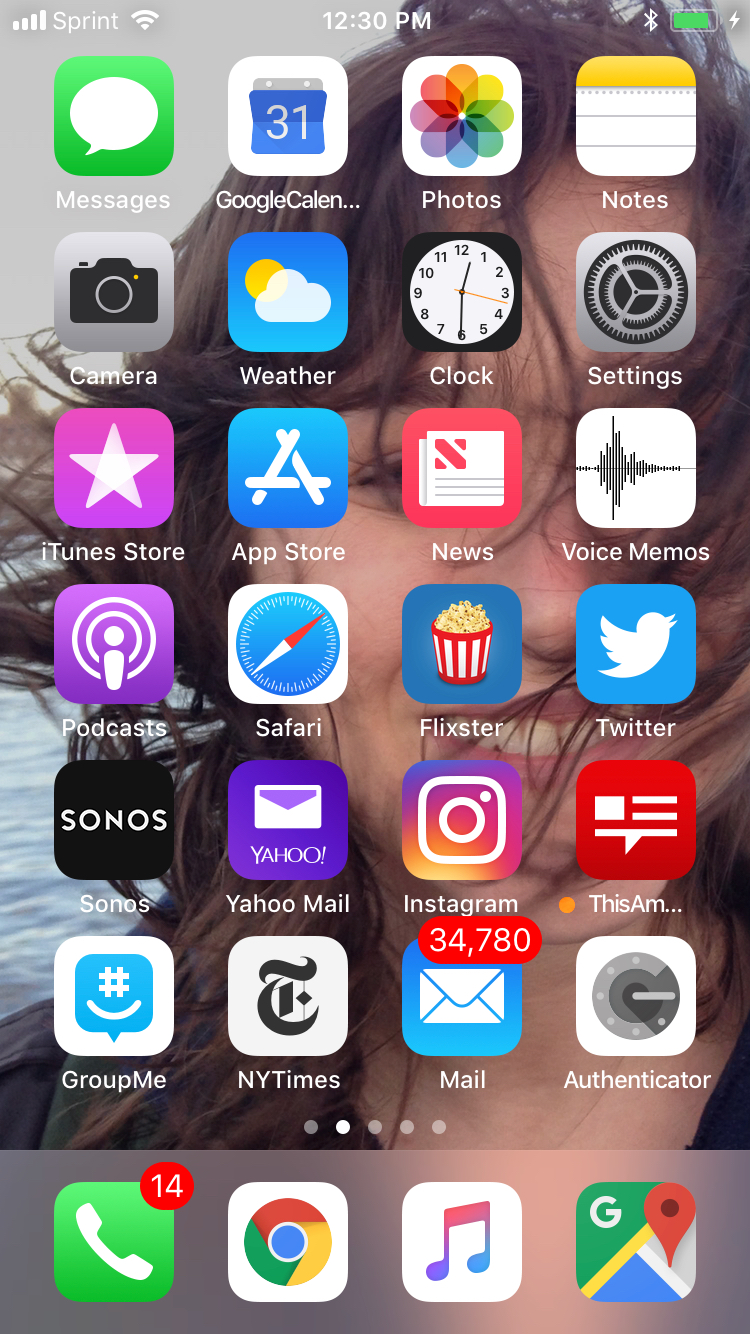
Seth’s home screen
Seth: Whatever you call the opposite of Inbox Zero. Right now I have 34,780 unread emails. People see that on my phone and freak out. But it takes more time to delete a message than to ignore it. Also, I don’t carry a bag to work. I realised I was carrying a bag for weeks and never put anything in it. So now: wallet, keys, phone, that’s it. Yes, this means I never go to the gym or pack a lunch.
Shane: I make a habit of checking the first half-page of Craigslist free once or twice a day. You won’t believe nice stuff that people, especially in a big city like New York, are too lazy to sell. I got speakers that usually sell for $1,957 on eBay the other day!
Allie: If you fold the bottom of the family size chip bag inward it becomes its own bowl.
Jeremy: I used to drink a ton of juice, which is not great. But now I drink a lot of 1/4 juice, 3/4 seltzer and it not only tastes great, it’s much less sugar.
What’s a problem you’re still trying to solve?
Alden: On the show, keeping our creative energy in the right place is something we’re just starting to wrap our heads around. Serialising improv is pretty uncharted territory, so we are learning how to stay in the sweet spot as we go. It’s important to make sure we don’t lose sight of the big picture by focusing on the moment-to-moment improv fundamentals.
But it’s just as important to make sure we don’t micromanage or script the process so much that we don’t have fun, which gets more difficult the more expectations we have from ourselves and our listeners, who are understandably expecting a lot of these ridiculous decisions to pay off in some meaningful way. We’re really interested to hear what our listeners think about season 2, since we’re trying to do a lot of new things while keeping all the stuff we liked best about season 1.
Winston: Living a creative life in an expensive city.
Seth: There’s that category of clothing that’s been worn, but not so much that it’s earned being laundered. These clothes end up an expanding clothes mountain on top of my dresser. Some people suggest that if an item supposedly doesn’t need washing, it is clean and should be put away. But I don’t want to mistake that shirt for one that is truly unworn. It’s a different category. I don’t think this problem will ever be solved. The earth is warming too quickly.
Shane: How to record the episodes with no mic bleed between cast members without putting them in soundproof pods which would totally kill the vibe.
Allie: I need to remember to drink more water.
Jeremy: I love my apartment but I need like one more closet. Or an extra set of cabinets in the kitchen. I’ll figure it out.
Answers have been edited, and some links have been added.
The How I Work series asks heroes, experts, and flat-out productive people to share their shortcuts, workspaces, routines, and more. Have someone you want to see featured, or questions you think we should ask? Email Nick.
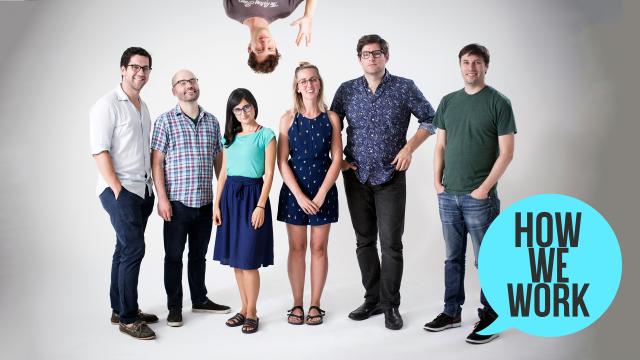
Comments